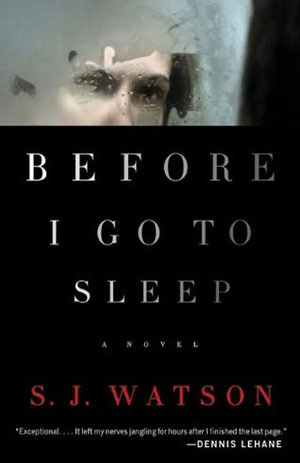Sunday, 26 July 2015
Before I Go to Sleep
Before I Go to Sleep opens promisingly: A woman wakes up in a strange bedroom, beside some old guy, and wonders what kind of party she must have been at the night before to have left with this grey-haired, paunchy dude. She sneaks to the bathroom, and as she goes to wash her hands, she realises that she doesn't recognise them – the bulging veins and crepey skin – and when she looks in the mirror, she's horrified to see that her face is aged and worn looking; at least twenty years older than she thinks she is. Then she notices the pictures taped around the mirror – pictures of herself with the guy from the bed at various ages – and with the labels attached to them, must accept that she has somehow lost twenty years of her life. The old guy, Ben, explains that he's her husband, she was in an amnesia-inducing accident twenty years earlier, and every morning he needs to remind her of these facts. Christine appreciates the enormity of the responsibility her husband has taken on for her, but when he leaves for work, she gets a phone call from a man who says that he's her doctor and that he wants to meet with her in secret. When they do meet, the doctor returns a journal that Christine had been keeping for the past couple of weeks and he urges her to read it. On the first page, in large letters in her own handwriting, it says: DON'T TRUST BEN.
That's a pretty exciting opening, right? Unfortunately, the rest of the book doesn't fulfill this early promise. The part immediately following the DON'T TRUST BEN is meant to be a transcription of the journal that Christine kept, and the most unforgivable aspect of this longest section of the book is that it isn't written in journal form, but like a regular novel with long exposition and chunks of dialogue. Even if, as it is revealed, Christie had been an aspiring novelist before her accident, no way does anyone keep a journal like this, with so much pointless minutiae, and especially when the whole thing is meant to be read each day so that Christine can preserve her memories, even if only on paper. Every day she records the confusion and fear upon waking, Ben's calm explanations, him leaving for work, Dr. Nash calling to remind her of the hidden journal, and then her experience of reading it before writing about what new happened that day – and this Groundhog Day-type repetition gets boring: yes, I get it, this happens the same way every day.
Because Christine is able to remind herself every morning (through her journal) what Ben has told her about her history, she begins to find holes and inconsistencies in his stories. And it is interesting to see her trying to figure things out – sometimes distrusting Ben, sometimes convincing herself that he must be under a lot of pressure to protect her from unhappy memories – and if you turn off your brain to the implausibility of the twists and turns, a reader can be successfully compelled to keep reading (at least to find out if the twists will eventually lead to where you're guessing they will).
The third section of the book happens after Christine has read the entire journal – up to the point where she had been prompted to write the DON'T TRUST BEN warning – and the plausibility factor totally plummets. In the end (and I don't consider this to be a spoiler, but maybe another would...skip the rest of this sentence if you want to be sure), Christine has the entire truth of her history revealed to her, she has begun to generate some new memories, and she has no idea if all of this will be wiped out as she is about to fall asleep once more. The end.
I picked up this book after reading S. J. Watson's second novel, Second Life, which I didn't really like, and reading in its reviews that people loved Before I Go to Sleep. To me, both books suffer from the same flaws: I don't particularly buy into novels that are written by men but from a woman's point-of-view (and especially with the themes of these books); both have totally implausible plotlines; and both have unresolved endings. Along the way, Watson is a fine writer – I didn't make note of any mindblowingly insightful passages nor any mindnumbingly dreadful ones – and in a Dan-Brown-kind-of-way, I'm sure he'll enjoy a loyal fan base. However, I can't see me giving him another chance. As an interesting coda, there was an article this week about a man with a similar case of amnesia: every day he wakes up thinking that it's March 14, 2005 and that he needs to go to his dentist appointment (the place where he likely experienced whatever event it was that caused his amnesia). I found the facts of this man's actual experience to be much more compelling than the potboiler that Watson invented.

